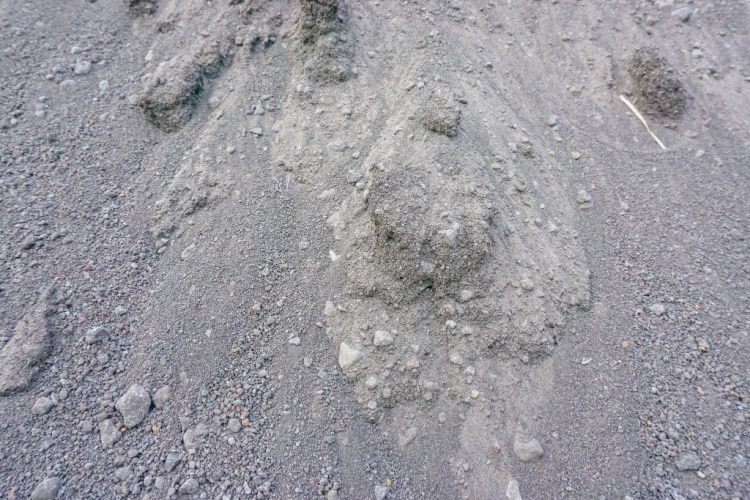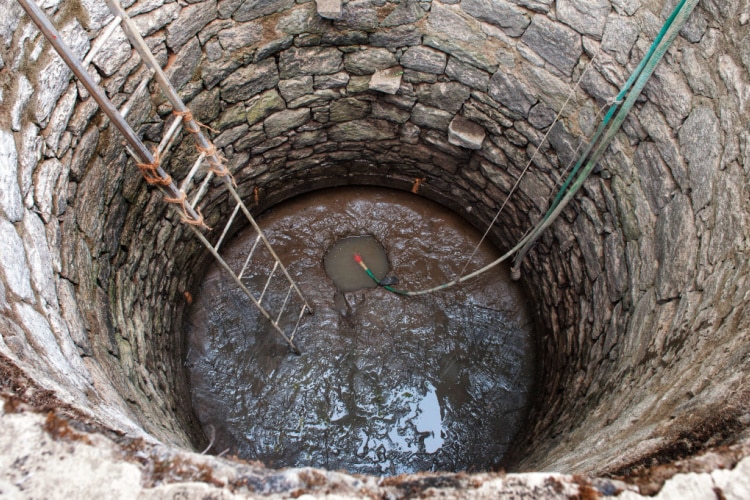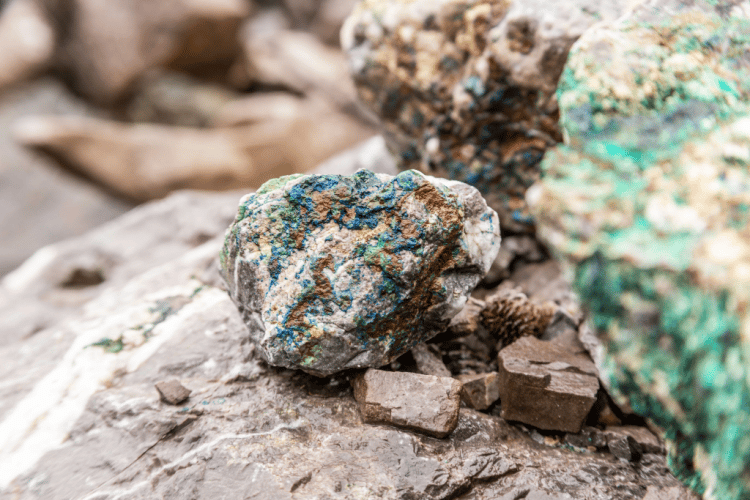We would all like clean, clear water from our wells, but this doesn’t always happen. Water contamination is a very common issue that affects even the most properly maintained wells. It’s not surprising to see the well water turn brown or yellow, however, black sediment in well water is very rare and many well owners may not be familiar with it.
Why is My Well Water Black?
Black sand or sediment in well water is caused by particles from mud or sand and silt in the well, which is usually a sign of groundwater depletion or a crack in the well casing. Mineral deposits from iron and manganese are also reasons for black well water.
As always, the first step is to collect a water sample from the well and send it to an EPA-certified lab. The lab will then send you a detailed list of all the minerals and contaminants found in the water.
The diagnosis will most likely point to one or more of the following causes:
- Mineral deposits of iron, manganese, or calcium carbonate
- Sand and silt
- Mud
- Organic chemicals
- Septic runoff
After testing, the next step is to find a solution. Here’s a quick tabular view of causes and solution:
| Black Sediment Causes | Solution |
|---|---|
| Sand and Silt in water | Check and replace damaged well casing, check and replace malfunctioning water pump, Install a sediment water filter |
| Mud in water | Wait a few days for the water to replenish, Make the well deeper |
| Minerals in Water (Iron & Manganese, Calcium carbonate) | Install a well water filter system (We recommend Springwell Iron & Manganese Filter) |
| Organic chemicals from Industrial Waste | Install a well water filtration system to remove chemicals (See our list of best well water filters) |
| Septic runoff | Disinfect well with shock chlorination, drill a new well away from the sewage/septic tank |
Sand and Silt in the Well
There are many ways sand and silt can make their way into your water source such as surface water runoff, a crack in the well casing, or a malfunctioning water pump. Regardless of the cause, black sediment is a natural effect of sand and silt settling inside the well.

Sand rarely poses a health hazard, but it may be an indication that the water source has also been contaminated by other pollutants like viruses, bacteria, and animal faeces.
Solution:
If the sand in well water is as a result of damaged well casing, then you need to replace the casing. Contact a certified well contractor to assess and recommend appropriate solution. Expect to pay around $6 per foot for PVC and $130 for stainless steel well casing.
If the problem is due to a malfunctioning pump, you’ll again need to contact a professional to have it replaced with a more suitable one for your well. Depending on the size and strength of the new pump, the prices vary between $1,000 – $5,000, installation fee included.
Also consider installing a sediment water filter like the Rusco spin down sand/sediment filter.
Mud in Well Water
Similar to sand, mud in well water is also another possible reason for black sediment coming out of the faucet. Unlike sand, mud is more severe and usually indicates groundwater depletion (especially during droughts) or well pump failure.

In the case of well pump failure, the pump can’t pull enough water from the source and sucks mud instead. Depleted groundwater will also cause similar problems for your neighbors, so talk to them to confirm your suspicions.
Solution to Mud in Well:
In the case of groundwater depletion, it’s best to stop consuming the water for a while in order to allow the water to replenish. However, you may need to make the well deeper if the groundwater doesn’t replenish after a couple of days. Expend to spend between $3,000 – $15,000 to expand the well.
Mineral Deposits (Calcium Carbonate or Manganese) in Well Water
Natural minerals such as iron and manganese are another major culprit of black sediment in well water. Manganese in particular has a brownish-black stain when it oxides and dissolves in water.
Additionally, if your groundwater runs over or through dolomite rocks or limestones, it most likely contains calcium carbonate. Calcium carbonate will appear like minute pieces of chalk in your glass of water.

Solution to Minerals in Well Water:
Removing manganese in water will require a special water filtration system like the Springwell Iron & Manganese Filter.
Organic Chemicals From Industrial Waste
Organic chemicals are essential in many industrial processes and products, including paints, dyes, inks, pharmaceuticals, and pesticides. An industrial spill or improper waste disposal can cause these chemicals to end up in your well through surface water runoff. When they’re inside the water, they decompose and may result in black sediment.
Solution to Organic Chemicals in Water:
The solution is to purchase a well water filter system to filter chemicals from the water. A good water filter costs more than $200 depending the size of your household.
Septic Runoff
A septic tank placed too close to the groundwater supply, or sewage leaks can contaminate the water. The human waste that leaks into the water source may result in black sediment residue in the water.
Unsurprisingly, septic contamination of drinking water poses the risk of pathogen water contamination. These pathogens can cause various viral, bacterial, and parasitic diseases.
Solution to Septic Runoff Water Contamination:
Treating water contaminated by septic runoff involves disinfecting the well with shock chlorination and installing a water filtration system. However, there are also cases where you’ll need to drill a new well away from the sewage system.
While a new well can cost $3,000 – $15,000, a new septic system is a bit more expensive at $6,000 – $18,000 average cost.